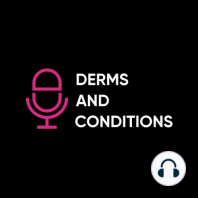25 min listen

Improving Our Understanding of How Drugs Work: Clarifying Questions with Monoclonal Antibodies and JAK Inhibitors.
Improving Our Understanding of How Drugs Work: Clarifying Questions with Monoclonal Antibodies and JAK Inhibitors.
ratings:
Length:
25 minutes
Released:
Sep 7, 2023
Format:
Podcast episode
Description
In Episode 59 of Derms and Conditions, our host, James Q. Del Rosso, DO, continues his conversation with Christopher Bunick, MD, PhD, an associate professor of dermatology at Yale
University School of Medicine who performs specialized research on novel treatments and therapies. After discussing sarecycline for acne in part 1, the two switch gears to monoclonal
antibodies.
Dr Bunick begins by discussing dupilumab, an IL-4 and IL-13 blocker with significant clinical efficacy and a favorable safety profile in treating atopic dermatitis (AD). He states that in a
network meta-analysis, upadacitinib and abrocitinib were shown to be more effective at treating AD than dupilumab, but dupilumab was shown to be more efficacious than tralokinumab and
lebrikizumab. He and Dr Del Rosso agree that despite being part of a similar class, each IL-13 blocker should be applied and understood individually. They note several cases where patients
who responded poorly to dupilumab had a beneficial response to tralokinumab, despite having similar mechanisms of action.
Next, they discuss IL-13 signaling, which is increased and more persistent in tissues compared to other cytokines. However, Dr Bunick explains that IL-4 has more potent signaling, so IL-13 isn’t
necessarily more clinically relevant. He notes that more research is required to further understand the structure-function mechanisms of cytokines in the cell. He then mentions the non-canonical
receptor, aka the “decoy receptor”, for IL-13, which could also explain a difference in drugs within the same class. Dr Del Rosso concludes that switching from one IL-13 blocker to another
in a patient who was initially unresponsive to treatment may be more favorable than escalating to an alternative class of medication.
Dr Del Rosso then discusses Dr Bunick’s recent publication that compared the adverse effects of common immunosuppressive drugs to those of upadacitinib and abrocitinib in the treatment of
AD. While the study population that used the common immunosuppressives did have comorbidities outside of AD, Dr Bunick notes that the risk of adverse events still exists for those
treatments in AD and is not present only in JAK inhibitors. Dr Del Rosso states that many risk factors can contribute to adverse events, and not all responsibility should be shifted to JAK
inhibitors. Tune in to this episode to learn the complete details about monoclonal antibodies and JAK inhibitors!
University School of Medicine who performs specialized research on novel treatments and therapies. After discussing sarecycline for acne in part 1, the two switch gears to monoclonal
antibodies.
Dr Bunick begins by discussing dupilumab, an IL-4 and IL-13 blocker with significant clinical efficacy and a favorable safety profile in treating atopic dermatitis (AD). He states that in a
network meta-analysis, upadacitinib and abrocitinib were shown to be more effective at treating AD than dupilumab, but dupilumab was shown to be more efficacious than tralokinumab and
lebrikizumab. He and Dr Del Rosso agree that despite being part of a similar class, each IL-13 blocker should be applied and understood individually. They note several cases where patients
who responded poorly to dupilumab had a beneficial response to tralokinumab, despite having similar mechanisms of action.
Next, they discuss IL-13 signaling, which is increased and more persistent in tissues compared to other cytokines. However, Dr Bunick explains that IL-4 has more potent signaling, so IL-13 isn’t
necessarily more clinically relevant. He notes that more research is required to further understand the structure-function mechanisms of cytokines in the cell. He then mentions the non-canonical
receptor, aka the “decoy receptor”, for IL-13, which could also explain a difference in drugs within the same class. Dr Del Rosso concludes that switching from one IL-13 blocker to another
in a patient who was initially unresponsive to treatment may be more favorable than escalating to an alternative class of medication.
Dr Del Rosso then discusses Dr Bunick’s recent publication that compared the adverse effects of common immunosuppressive drugs to those of upadacitinib and abrocitinib in the treatment of
AD. While the study population that used the common immunosuppressives did have comorbidities outside of AD, Dr Bunick notes that the risk of adverse events still exists for those
treatments in AD and is not present only in JAK inhibitors. Dr Del Rosso states that many risk factors can contribute to adverse events, and not all responsibility should be shifted to JAK
inhibitors. Tune in to this episode to learn the complete details about monoclonal antibodies and JAK inhibitors!
Released:
Sep 7, 2023
Format:
Podcast episode
Titles in the series (79)
Relationships in Dermatology: Elevating Your Career Through Mentorship, Diversity, and Leadership with Amy McMichael, MD by Derms and Conditions